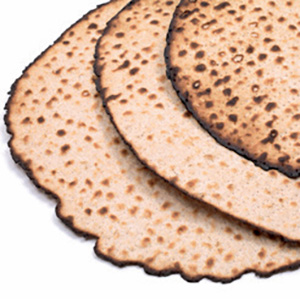
Flour. Water. Eighteen minutes. There are six foods on display on our Seder table and each food has a symbolic meaning. We are instructed to think about the bitterness of the marror. Not once, but twice. On Pesach, we are forced into mindful eating practices, and this opportunity, built into the Haggadah, is the secret to avoiding the pitfalls of Pesach’s mindless munching and eating.
What is mindful eating? It is being aware while eating and noticing cravings and physical cues. Essentially, it is reconnecting your mind and your body, which are often disconnected during eating.
Mindful eating is not as simple as it sounds. The practice of reconnecting the thought of wanting to eat to the action of eating is sometimes funneled through a subconscious neuron pathway that houses habits like brushing our teeth and using a turn signal while driving. We don’t realize why we are doing it, it just happens. This makes it very hard to make an educated decision about what to do with the thought of eating. Through the practice of mindful eating we recognize our desire to eat, elevate that desire out of our subconscious and examine this thought in a smart, educated way. Through this practice we funnel this thought through an active, conscious neuron pathway instead. This makes us question exactly why, how much and what type of food we want. We are re-learning our eating habits by paying attention to the cues that lead us to eat. Mindfulness transforms eating from a habit into an active decision. This practice has been shown through research to be a tool to improve health, decrease pain and dodge sickness in large part because it reduces stress and promotes optimal digestion.
The seder is a meal at which we focus on the food that we are eating. We don’t just sit around and talk about the weather or politics, hopefully, but rather about why we dip food into saltwater and why our matzah is broken. We are eating with full awareness. However, the irony of our habits the next day is not lost on me. It’s as if we forget everything we learned about mindfulness during the seder and the next day, we eat mindlessly, either picking at potato starch cakes and macaroons or spending lost hours in the tea room with mini plates of food we don’t realize we are eating.
Where has our training gone from the night before? This Pesach, think about your food in this way:
- Eat at set times and in set places.
- Pay attention to the food that is in front of you. Say a bracha.
- Ask yourself “Why?” “What?” and “How much?” do I want?
- Let your body catch up to your brain; eat slowly.
- Savor your treats; be present in order to enjoy them.
- Listen to your body; stop eating if you are beyond fullness.
I believe that each holiday brings an opportunity to better ourselves in some way. When we eat matzah and marror, we use mindful eating practices to exhibit the freedom of our nation, and it’s my hope that these practices also help you also achieve personal freedom with food, one bite at a time.
By Rivki Berman
Rivki Berman is a registered dietitian and owner of RB Nutrition LLC in Fair Lawn. Rivki practices a realistic, sustainable approach to nutrition and works with all adults looking to change their lifestyle for good. Her specialties are in PCOS, diabetes, eating disorders and emotional eating. She can be reached at [email protected].













